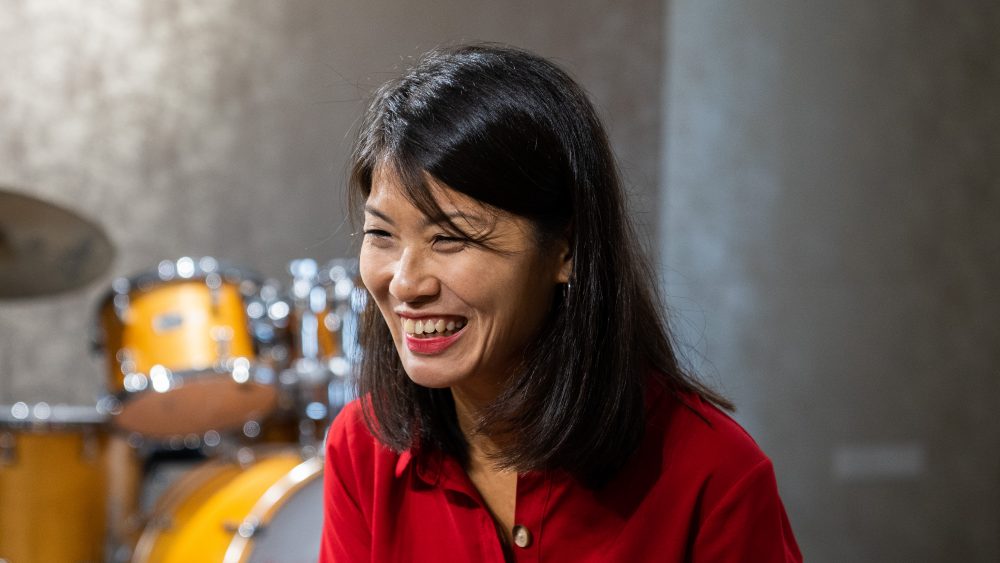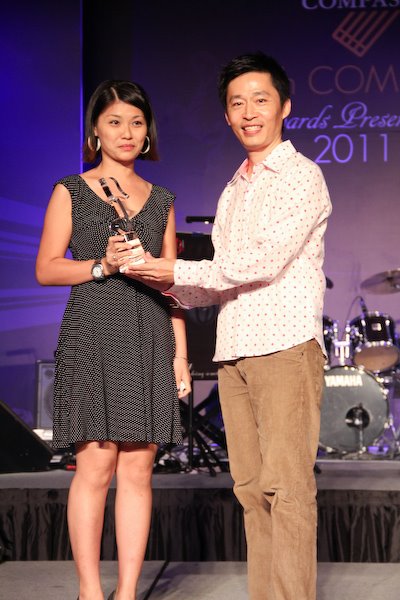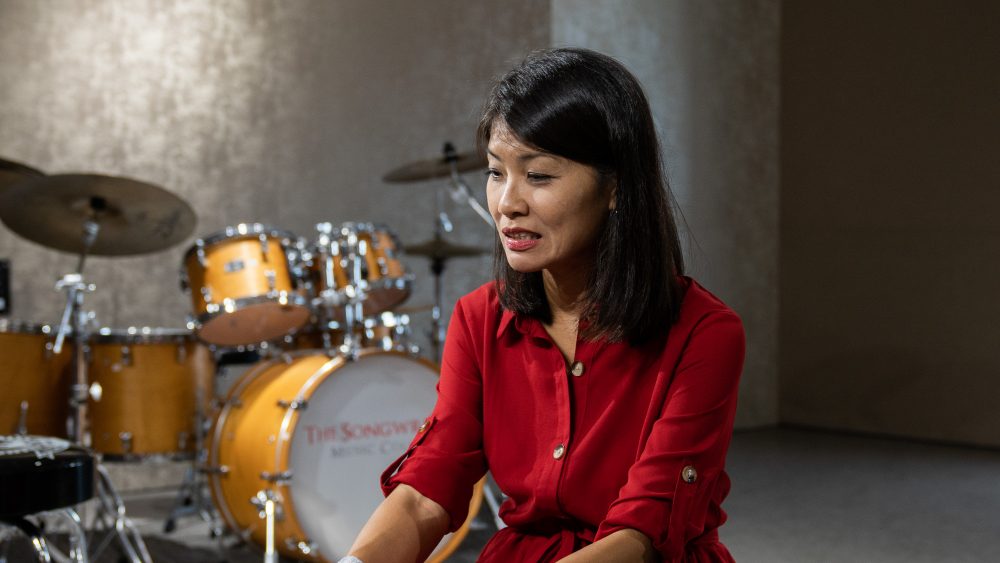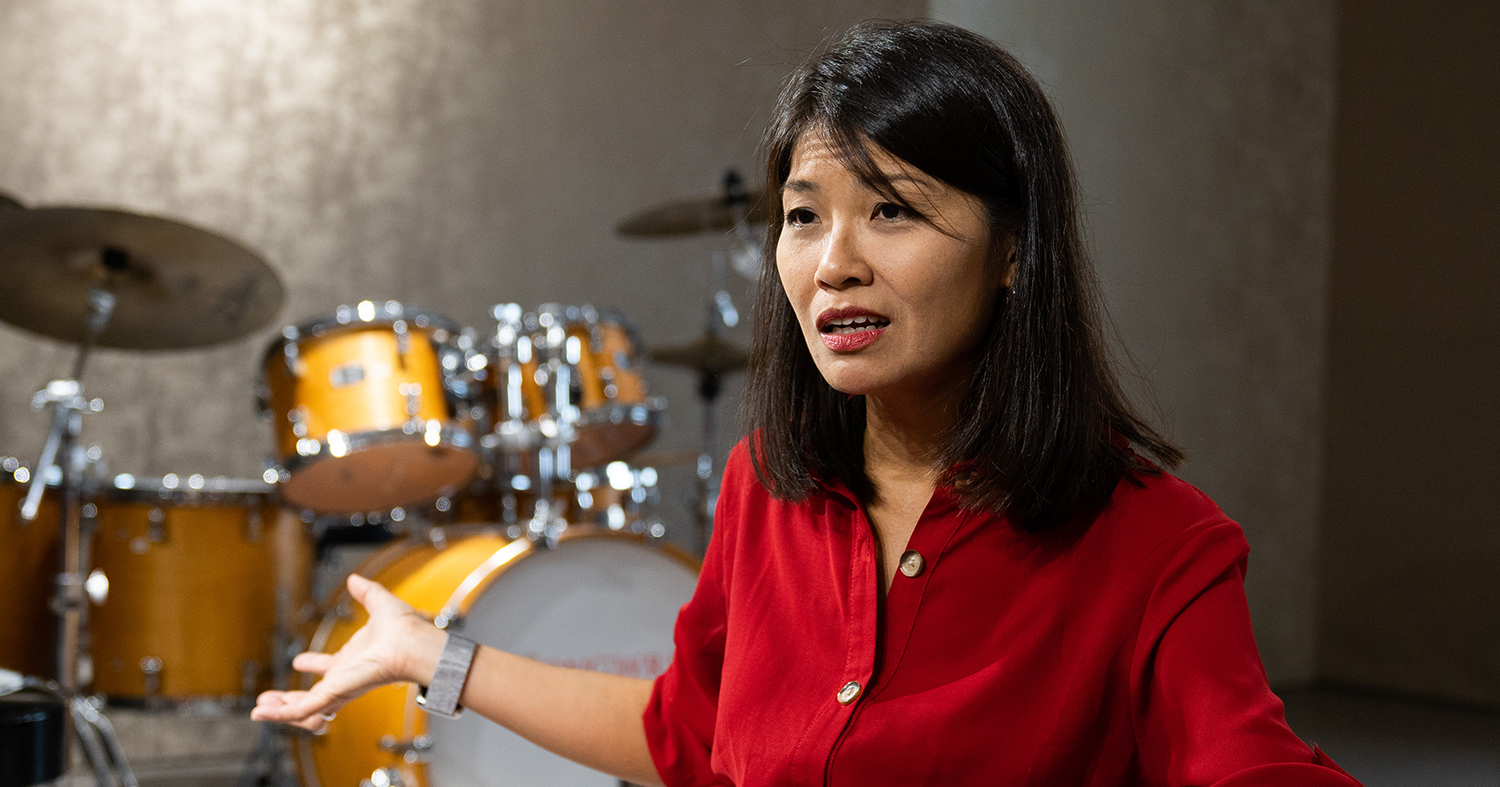What kind of a person does it take to write sad love songs?
I ponder this question as I sit across from Singaporean lyricist Lin Kebang.
The 45-year-old, better known by her pen name Xiao Han (小寒), is the wordsmith behind popular Mandopop songs like Stefanie Sun's "Rainy Day" (雨天), Gary Chaw's "Mr Lonely" (寂寞先生), and Elva Hsiao's "Dare to Love" (敢伤).
A cursory glance at these titles will give you a rough idea of the emotional rollercoaster ride her songs will take you on.
But looking at Lin, one doesn't get the impression that this is a lady who trafficks melancholia.
Instead, she's dressed in red, fast-talking, bubbly and humorously self-deprecating, stressing repeatedly that she, being very much an introvert, is much more comfortable staying away from the spotlight.
"I don't seek to be famous, or like, hey-look-at-me," she says. "If I wanted that, I would have done that long time ago. I'm very comfortable hiding behind everybody."
Eavesdropping in public
In fact, it seems that most lyricists are introverts because, according to her at least, a good lyricist needs to observe the world around them.
"If you're an extrovert, you're probably just busy making merry and making other people laugh. So you probably don't have the time or the space to stand in the corner and observe."
It's a skill that the self-proclaimed "biggest kaypoh on earth" takes pride in. She lets on that she loves eavesdropping on people in public.
Most of these aren't all that interesting, of course. But there are gems to be found — gems that in some cases even become Lin's inspiration for her lyrics.
 Conversations overheard in public have become inspiration for Xiao Han's songwriting. Photo by Rachel Ng.
Conversations overheard in public have become inspiration for Xiao Han's songwriting. Photo by Rachel Ng.
Like one time she overheard a young couple arguing over a meal.
"The boyfriend was trying to feed her rice and he was like, 'Can you stop crying? Your soup is getting saltier'," she says, before bursting into peals of laughter.
She tells me about another time she was on the Eurail when she overheard a man say, rather passionately, into his phone: "Do you think this is what I want? For us to be apart?"
"I was like, woaaaah, ooh la la!" she gushes. "It was so romantic you know!"
Started as an A*STAR researcher
Writing has always come easily to Lin, who took home the first prize in a song-writing competition when she was 18.
But as the daughter of a fish farmer, she had to give up her aspirations for a more practical choice as a researcher with A*STAR in 1996.
It was an almost perfect job, she says. The only living things she had to see daily were chickens, which were used in her research into coronaviruses.
"I love science because I find that there's a purpose behind it. There's a tangible purpose because you know that whatever you've done could have an impact eventually. It's a very meaningful job for me."
But even then, Lin was writing songs on the side. Within the same year of joining A*STAR, Xiao Han signed with her first music publisher.
Her first big break came when "No Regrets", a song she wrote for a singer named Denise Ruan, was used for a Condor Heroes drama in 1998.
There were times when she found inspiration in her research work.
She shares that the lyrics for Jam Hsiao's "Clone" (複製人) came about when she was frustrated with cloning E. coli.
"I was like, wah so many E. coli. You all very free hor? I only got me. I got so many jobs leh. Can I clone myself?"
From there, she started writing songs that would get featured in productions for the then-Television Corporation of Singapore (TCS).
And so Lin was thriving in her songwriting, although not everyone was on board with her side hustle.
Once, her A*STAR mentor spotted her full name in the end credits of a local TV show. He did not approve.
"He said, ' No, no, no, you're an academic person. You cannot mix with entertainment because entertainment will corrupt your brain'."
"I was like....," she mouths something unprintable before bursting into laughter.
Focusing on her PhD would earn her more money too, her colleagues would say, arguing that songs, especially Chinese ones, were "so childish".
"Unfortunately, a lot of people feel that people who are good in Chinese are a class lower, which I think is not true," she said.
Lin sits on the Promote Mandarin Council which, as you might imagine, focuses on promoting the value and importance of speaking Mandarin.
The class characterisation is an unfair one, she adds, because while everyone knows the advantages of bilingualism, being able to speak both Mandarin and English fluently doesn't seem to sit well with people:
"Why is it that someone who can speak English and Korean are seen as 'cool'? Just because I speak Mandarin, does that make me one class lower?"
 Xiao Han receiving an award from veteran composer Liang Wern Fook in 2011. Via.
Xiao Han receiving an award from veteran composer Liang Wern Fook in 2011. Via.
But Lin was not about to give it up something that she clearly was talented in. She tells me, rather shyly, that she's not a particularly smart person:
"It may look like I had a lot of accomplishments (in academia) but I actually did all those things with 300 per cent of my effort. But with songwriting, I only need 100 per cent or 150 per cent to get something decent. I'm not going to give that up! Science was a lot harder for me but writing songs came naturally to me."
So she chose to soldier on balancing research work and songwriting, but this time, writing under a pen name instead.
The breakdown
It seemed like Lin could do it all but little did she know, it was about to fall apart.
One year after the birth of her daughter, at the behest of Lin's friend musician Eric Ng, she joined him in setting up a music publishing company and school called Funkie Monkies.
A typical day would see her rushing to A*STAR in Biopolis in the morning for her research work.
She would skip lunch, and use the time to travel to Funkie Monkies' studio in Bugis to do administrative work, before rushing back to Biopolis after her lunch break.
After work, she would pick up her daughter from childcare at 7pm and spend time with her until she fell asleep. Later at night was the only time Lin could write in peace, with her day often ending at 3am.
"Everyday I was surviving on three, four hours of sleep or less. I couldn't cope at all. I was going bonkers," she says.
It all came to a head in 2006 when she suffered a breakdown.
Her mood plunged and she often found herself crying uncontrollably and being physically incapable of getting out of bed ("Because I just... couldn't").
She was later diagnosed with dysthymia (chronic depression), triggered by overworking.
Falling into depression
Looking back, Lin admits there were indications that she may always have been plagued by chronic depression.
"Why are you always so negative? Why are you always so down, why don't you have energy?" she recalls her junior college classmates often asking her.
She also said she used to be so listless that she would need three to four cups of espresso to perk herself up.
Simple activities like food and television did nothing to stimulate her mood either.
"In fact, I think I enjoyed crying more," she says. "When I heard a really sad song, that was when I felt something."
During her depressive periods, Lin says she could go without eating for three to four weeks straight, then just drink a cup of Milo when she's feeling faint.
That's when she knows her spark is gone.
"When that happens, you don't see this," she smiles wryly, gesturing to her dolled-up self.
Does her depression give her the ability to write better sad love songs then?
Lin pauses. What follows is her best attempt at describing the surreal experience of being consciously depressed:
"When you're in that deep deep hole, you can feel and see the difference. A lot of things are in monochrome. A lot of things are just grey."
However, in that state, there is just no will to do anything, even writing, until her body decides to tweak the chemicals in her brain and come out of its funk.
"I'm not going to go there"
It is during the "upturn" — think of it like switching from a low-contrast screen to a high-contrast screen, when her senses are ignited by the sudden influx of technicolour stimulus — that Lin finds herself most productive.
"But I'm not going to go there," she says resolutely, shaking her head.
"A lot of creative people like this part, that's why they will get drunk, try to get a lot of stimulus, take drugs, do a lot of crazy things just to feel alive. I don't want that. I don't think that is a healthy way to create art."
Similarly, many creative people — singers and lyricists alike — romanticise the idea of depression, which to Lin is absolute rubbish.
"When you're in that state, it's really ugly. You don't feel like bathing, you don't feel like eating, every day you're just crying, and you're dirty and you don't care about anything."
 Falling into depression is not a pretty thing and should not be celebrated, she says. Photo by Rachel Ng.
Falling into depression is not a pretty thing and should not be celebrated, she says. Photo by Rachel Ng.
Of course, there are times when sad songs are helpful — listeners sometimes find they help them process grief.
"Sad songs can heal grief slowly, because it makes you feel that someone is next to you, understanding what you're going through," she says.
But in cases of depression, Lin opines that sad songs may not be a good thing because they might lead one further down into the hole — hence, she says, she makes a conscious effort not to write "super duper sad" songs.
And which, to her, is the saddest song she's ever written? That accolade, she says, would go to "Mr Lonely".
"I don't think artists should be romanticising or promoting depression because it is not a pretty thing and you cannot be productive with depression."
Running (a lot) as an alternative to medication and counselling
Lin's 2006 burnout was just the beginning, sadly. In 2011 and 2015, she again experienced major depressive episodes that she says crippled her.
These experiences, she says, were also a wake up call for her to do something about her condition, for the sake of her family:
"I felt that I should be a good example to my kid. I've always wanted to be a good mum in the sense that I'm a good example. I didn't want to leave her the impression that life is as such. I still want to be the upbeat mum that I am whenever I am OK."
"I decided that I had to do something about here," she says, pointing at her head.
Looking for an alternative to medication (it would numb her creativity) and counselling (didn't work for her), Lin turned to jogging up to a mind-blowing 11km a day for the endorphin boost it offers her.
"I try to clock 220 to 230km a month because that keeps my mood up," she says as if it's no big deal, while I reach down to pick my jaw off the ground.
Competing against 600 other lyricists
In 2008, Lin left A*STAR to focus solely on her music career.
Despite being a veteran lyricist today, there are still times when she comes up against other lyricists — such, she says quite plainly, is the reality of the songwriting business.
Of course, record labels do approach veterans like her directly with exclusive songwriting requests, referred to as zhuan an (专案).
Lin says it's more common these days, however, for record labels to send out requests for submissions, referred to as bi gao, 比稿, from multiple lyricists — sometimes as many as 600 — before choosing the best.
"Sometimes when they ask for this kind of competition, it's because they're looking for sparks and new stuff," she says. "I think for somebody who's like half a century old, it's very difficult for me to write something that's like (the super trendy) 'Learning to Meow' (学猫叫)'."
These days, thankfully, Lin usually can look forward to more "zhuan an"-type jobs.
Also because she is effectively bilingual, record labels seek her work directly for adaptations, like translating Korean songs into Mandarin:
"I can't speak Korean, they can't speak Chinese. But we can converse in English. They need Chinese lyrics because they need the Chinese market."
There are, of course, challenges she faces, especially when it comes to Chinese lyric writing because the Chinese language has four different tones. Mixing them up can often lead to hilarious results:
"For example, if you want to write jī tuì (fight back) but you use the wrong sounds and you might get jī tuǐ (chicken drumstick). Or shuì jiào (to sleep) might become shuí jiǎo (dumplings). Then you start to have food imagery pop up in your song."
 Xiao Han at the Global Chinese Golden Chart. Via.
Xiao Han at the Global Chinese Golden Chart. Via.
As a not-so-young lyricist, she is also learning to experiment with different styles, like learning how to write rap lyrics from Gong Ge (宫阁), a rising artiste in China.
"He really pushes me to the limit because he would say something like, 'I want something even more racy', but I'm like eh, I'm aunty leh, you ask me to write something racy, I a bit shy leh."
It's difficult, but Lin says she is persisting in her quest to stay relevant because she knows what she describes as the "half-rap-half-sing" type of production is very appealing to young people.
Young people's mindsets today, she observes, are of course drastically different from 20 or 30 years ago, and learning to communicate with a younger audience through her lyrics resulted in a paradigm shift for her personally.
They are not entitled spoiled brats, she says, but instead often misunderstood and mired in anger issues.
"Our generation was writing stories and lyrics like that — hard work will always bring whatever. But the new generation doesn't think that way because for them, tomorrow may not come so they may take the fastest route to do what they love. It may not pay very well but who cares."
But regardless of whether she is writing for the young or old, Lin says she always endeavours to touch the hearts of those who listen to the songs she writes.
There's something decidedly ironic yet beautiful about a writer who struggles to be happy, yet whose words have the ability to comfort.
"Whatever I do, whatever I write, it has to serve a purpose. My function is to make people look at things from a different angle," she says.
Watch Xiao Han explain what makes a good karaoke song
Interview quotes were edited for clarity. Top photo by Rachel Ng. Special thanks to Funkie Monkies.If you like what you read, follow us on Facebook, Instagram, Twitter and Telegram to get the latest updates.
